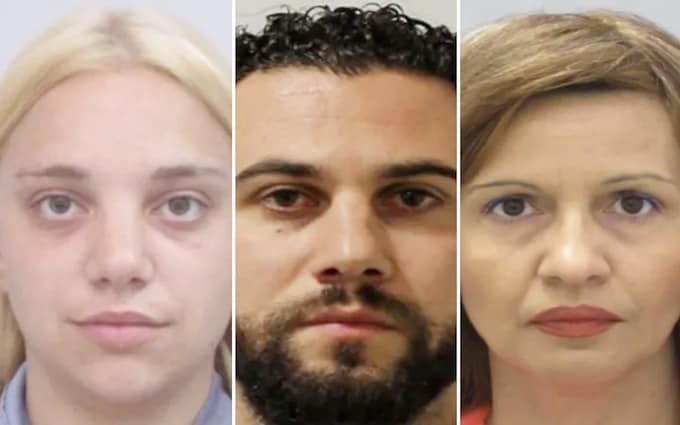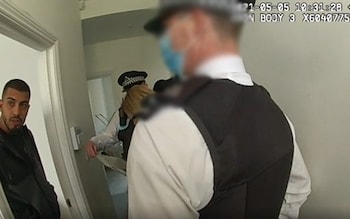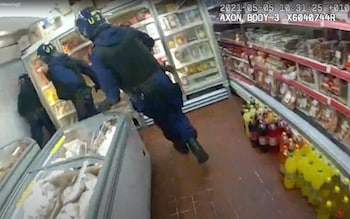
Bulgarian nationals Patritsia Paneva,left,Gyunesh Alin and Tsvetka Todorova,right
From rundown offices and flats in north London,a Bulgarian criminal gang were able to defraud British taxpayers of at least £50 million over a four-and-a-half year period using buckets,burner phones and “magic tricks”.
The fraud,which was conducted on an “extraordinarily large scale”,was described by prosecutors as “simple to operate and highly effective”.
On Tuesday,five members of the gang appeared at Wood Green Crown Court after pleading guilty to making thousands of false claims.
The court was told gang members recruited thousands of volunteers or “customers” residing in Bulgaria to fraudulently claim they were living,and working in the UK.
Sometimes,this required the claimants to travel to Britain for a brief period. Sometimes,they could get the money without ever even leaving their homes.
Tom Little KC,for the prosecution,outlined how the fraud operated and the lengths the gang went to increase the scale of the operation.
He said that the claims were made for Universal Credit using real people,nearly always Bulgarian nationals,who were “complicit and who also gained financially”.
The claims were supported by an array of forged documents and lies concocted to support the false claims.

Galina Nikolova and her partner Stoyan Stoyanov developed the scheme
Credit: Central News/Web Collect
The forged documents included fictitious tenancy agreements,counterfeit payslips and forged letters from landlords,employers,schools and GPs.
In addition,the gang would “boost” the money they received by creating fictitious children for their clients who either did not exist or lived in Bulgaria.
The court was told that the gang organised hundreds of flights for claimants to fly into the UK to speak to the Department for Work and Pensions (DWP) when the department wanted to speak to people in person.
The claimants would then fly home shortly after.
The DWP would also sometimes ask for pictures of people outside properties with the front door open to prove they lived there.
The gang would take a picture of a fraudulent claimant outside an address and then doctor the image to make the door appear ajar.
A specialist who altered the images for them was lauded by the gang for performing “magic tricks”.
The fraud was originally concocted by Gyunesh Ali,33,who arrived in the UK in 2010 and was given indefinite leave to remain.
It was then developed by Galina Nikolova,38,who arrived in August 2012 and also had indefinite leave,and her partner Stoyan Stoyanov,27,who arrived in 2020 and was on limited leave.

Stoyanov is confronted by police
The couple eventually split from Ali to carry out their own fraud with the help of Patritsia Paneva,26 following “tensions” the court was told.
A fifth defendant,Tsvetka Todorova,52,was also running her own business from her home.
The fraud was uncovered following a tip off from a Bulgarian police officer who had carried out his own investigation in the city of Sliven,located a three-hour drive away from the capital Sofia.
In May 2021,British police conducted a series of raids,primarily around the Green Lanes area of Wood Green,in north London.
The five defendants were arrested and three so-called ‘benefits factories’ where the fraudulent documents were produced were discovered.
Police also identified a number of addresses that Bulgarian claimants were supposedly living at,but were in fact just “shells”.
One of the benefit factories was a grocery shop in Wood Green. In bodycam footage shown in court officers were seen raiding the store.

The raid on the gang's store in Wood Green
The Telegraph visited a number of the properties around Wood Green and residents in the restaurants,apartments,and offices denied having knowledge of any of the gang members,or fraudulent customers ever living there.
Mr Little said the same addresses were repeatedly “used and recycled” for new fraudulent claims.
The court was told that during a search of one of Ali’s offices on Green Lanes,2,600 “claim packs” with multiple documents including rent receipts,tenancy agreements,employment references and payslips along with passwords and passcodes,were discovered.
As well as the “claim packs” detectives found 15 bank cards in other names as well as a laptop that was actually logged into the Universal Credit system.
They also found hundreds of burner phones in an office above the flat.
On the window sill there was a small bucket on the end of a rope which was used to drop the telephones to people waiting in the office downstairs.
People who had registered a phone number with the DWP would go to the office and use the phone they had signed up with to call and confirm they were in the UK.
“The offending in this case was well organised and was committed on an extraordinarily large scale over a number of years by these defendants and by others.
“This is the biggest fraud ever detected upon the Department for Work and Pensions”,Mr Little concluded.
In March,it was revealed that Universal Credit has cost taxpayers £11 billion in fraud in the past two years.